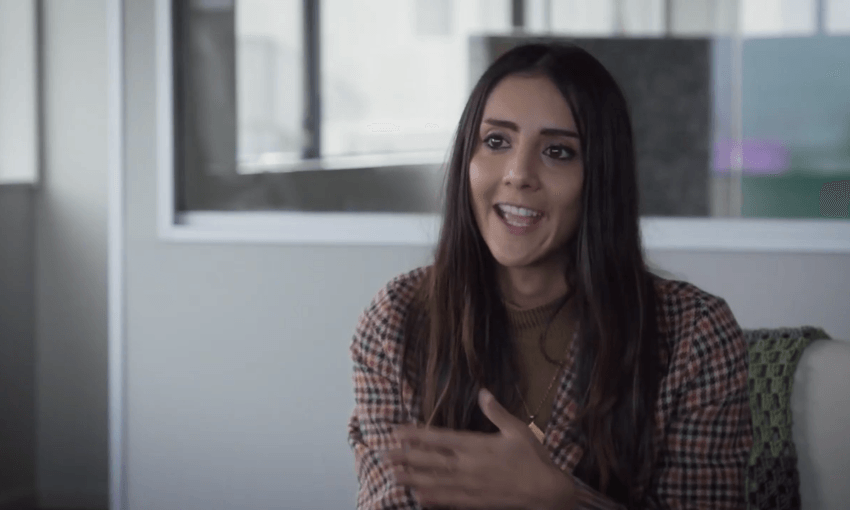The Green MP has been given extra security following threats of violence. She tells the Spinoff about the ‘barrage of hate’ she confronts.
Green MP Golriz Ghahraman has described the “barrage of hate” she has received since becoming a member of parliament, and its impact on her life and employment.
In an interview with Leonie Hayden for a forthcoming episode of the Spinoff webseries On the Rag, recorded last week, Ghahraman said threats of violence had begun almost as soon as she announced her candidacy for parliament. That escalated after the Christchurch terror attacks. “I was literally getting threats of gun violence just from being perceived to be Muslim, so that community has definitely been getting threats, hate crimes, they’ve been reporting it.”
It was revealed this week that Ghahraman has been assigned a security escort at parliament in response to heightened threats. That followed comments on a radio programme by ACT Party leader David Seymour, who said Ghahraman was a “menace to freedom” because of her views on hate speech laws. These comments were made the same week an investigation by Patrick Gower for Newshub revealed conversations in a white supremacy Facebook group about lynching and hanging the Green Party MP.
Gharaman has called for a debate around hate speech laws following the terrorist attacks in Christchurch.
The freedom of speech debate had become hopelessly lopsided in its focus, she said.
“When people speak about free speech, can you actually address the thing that’s silencing those without power as much as you talk about giving a voice to people who already have it?”
She had been both buoyed and alarmed by the responses to her election to parliament.
“I’m always really shocked by how excited and touched people are by having the representation. I didn’t expect that, but then you get an equally really scared, panicked, angry mob who didn’t expect to have that representation happen either.”
She added: “I especially get it when I appear to be confident. They hate that.”
She spoke frankly, too, about her struggle with anxiety.
“I have therapy for anxiety. And I think for me, it’s probably started with giving me quite a strong dose of imposter syndrome back in the day in my life. I never saw anyone like me in the positions that I wanted to be in, and there’s not a whole lot of refugees in the law, or in the UN. And there’s not a whole lot of refugees doing a Masters at Oxford, you know? It’s kind of a weird – every room you walk into, you are different and underlying that is that you’re maybe less deserving …
“So, that certainly causes anxiety, but I think now that it’s in terms of actual abuse, rather than micro-aggressions that you get every day undermining you generally, it’s definitely a heightened sense of anxiety. If I see something that’s particularly threatening then it makes me worry about my family, and worry about all the other sort of young women of colour that might be consuming it when they look at my articles and things. You kind of feel that responsibility.”
The sort of messages that had become familiar to women of colour in parliament were alien to white male colleagues, said Ghahraman.
“I don’t think you can know. And I think the other thing that we’ve talked about, or at least I’ve talked about with both Louisa [Wall] and Marama [Davidson] is that it hardens you, and how to combat that. And so, you kind of, you bring that armour that you’ve had to put up, and that kind of lowered … I don’t have any emotional reserves some days, because I’m consuming all of that …There’s that whole thing where we’re trying to balance out having that exterior shell and having the defence mechanisms, but then not allowing that to change who you are.”
Research has established that people of colour are “experiencing micro aggressions in a way that’s causing us mental health harm to the same level as soldiers who are based in combat zones”, said Ghahraman.
“The levels of anxiety and stress of just us living as people of colour in the world are at that level now. And the reason I’m happy that that research exists is because I think that it is really difficult for us to talk about the tiny little ways that we’re all being abused, and not being kind of told that that’s just a one-off, and it’s not racism, it’s not because of this, it’s not because you’re a gay man of colour, it’s actually just you didn’t get the promotion.
“So, we can go, ‘Actually, this collective gas lighting can end. Can it please end?’ It is happening.”
The full interview will screen as part of the next episode of On the Rag, made with the support of New Zealand On Air. View them here

